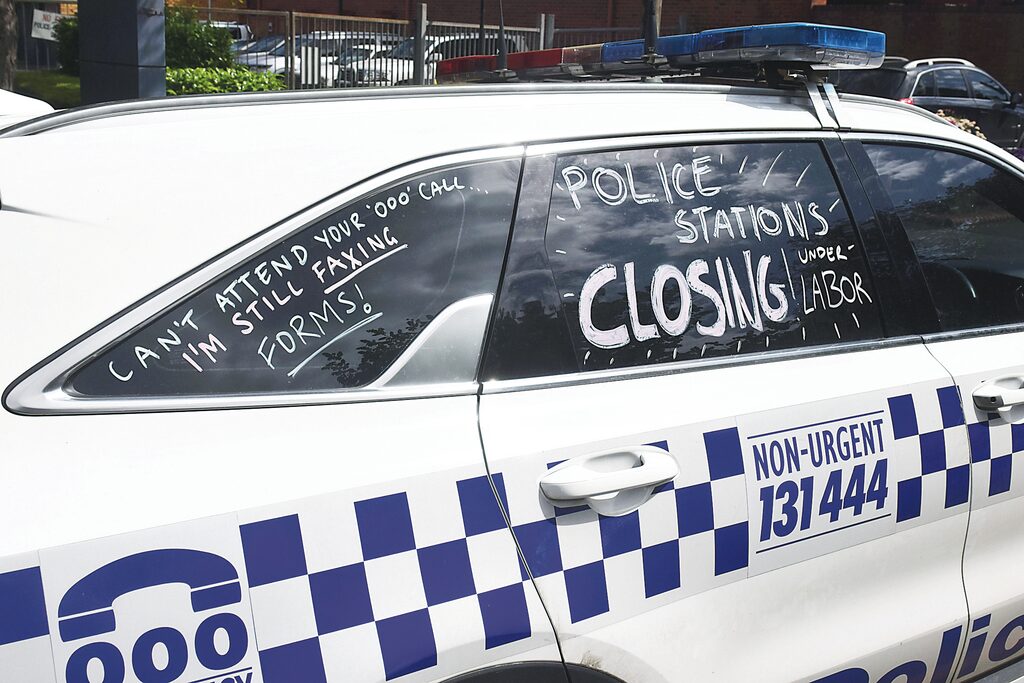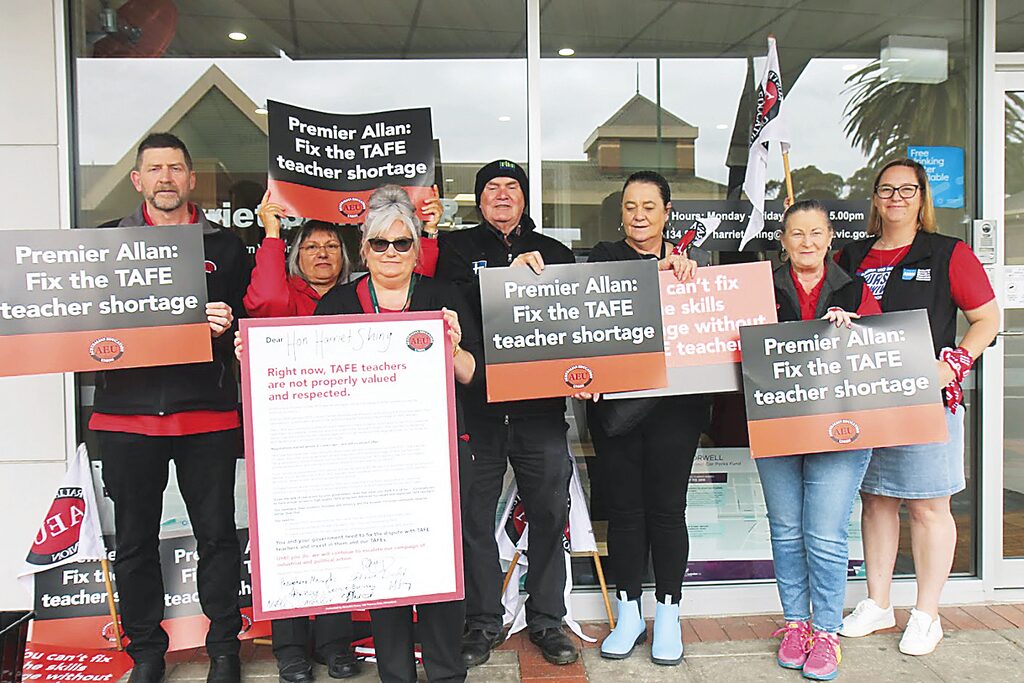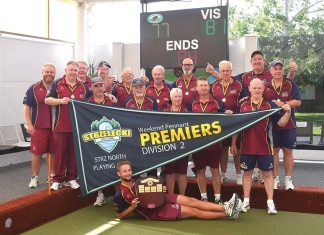By TOM HAYES and KATRINA BRANDON
POLICE all over the state and local TAFE teachers are the latest to demonstrate their plight amid a seemingly growing list of occupations currently in the firing line.
Victorian police officers demonstrating Protected Industrial Action (PIA) recently entered Phase 2, ramping up their efforts for increased wages.
A small rally of TAFE teachers was also held in Morwell last week outside the office of Member for Eastern Victoria Region, Harriet Shing, as the Australian Education Union (AEU) reports 71 per cent of TAFE teachers are considering leaving the profession.
LIKE police, TAFE teachers are calling for better pay.
The AEU estimates that from January next year, an experienced TAFE teacher will be paid almost $9000 less than a similarly experienced school teacher.
AEU Gippsland Organiser, Jeff Gray said that TAFE teachers hadn’t had a pay rise in two years.
“We are calling on Harriet Shing to put a lot more pressure on the state government and down on the Premier to dissolve a dispute by doing something about workload and putting a very significant pay deal on the table,” Mr Gray said.
“Nothing has been offered to reduce the workload, and nothing has been offered for pay but three per cent. The three per cent deal will keep TAFE teachers well below school teachers, probably $8-9000 annually. We have significant shortages across our TAFE and still have Australia’s lowest funded TAFE system.”
Mr Gray told the Express that AEU members are currently disappointed and frustrated. He also said that one of the problems they are having is that TAFE loses teachers who go back on the tools or go back into the industry to make more money, putting more workload on other teachers.
In response to the AEU, Ms Shing said she is constantly advocating for the community, including TAFE teachers who help workers learn new skills.
“I am looking forward to meeting with our hardworking TAFE teachers and supporting the valuable work they do,” she said.
“Recent discussions between the union and the TAFEs have been constructive, and we expect the union and the Victorian TAFE Association to reach an agreement soon.
“The government encourages the parties to continue bargaining in good faith, to ensure the proposed agreement is within our wages policy – while delivering a fair outcome for our critically needed TAFE educators.”
VICTORIA Police’s Enterprise Bargaining Agreement was due to expire last year, and investigations began as to how conditions could be improved for police officers. Once those proposals were made, negotiations began for the 2024 EBA.
Victoria Police are asking for a six per cent annual pay rise over four years, with 8.5-hour shifts to allow time for members to ‘kit-up’ and ‘de-kit’ during their paid hours.
A police officer, who wished to remain anonymous, spoke to the Express regarding the state of the force and the PIA.
“Basically, we are overworked and underpaid. The cost of living is going through the roof and what we’ve been offered isn’t even in line,” they said.
Police unanimously voted ‘no’ to the first offer last month, which included a pay rise of four per cent over four years, triggering the implementation of Phase 2.
“This is the first time ever that the majority vote has been a ‘no’, and they’ve had to go back to the drawing board,” the police officer added.
The offer also included nine-hour shifts, which would include an extra day off every fortnight, however the reality was it would not be fully implemented for almost four years, and only if there were sufficient sworn members to facilitate it.
The Police Association of Victoria (TPAV) gave an update to the Express regarding the EBA negotiations and PIA.
“There have been no negotiations with Victoria Police for some weeks now over the EBA. Victoria Police has applied to the Fair Work Commission for an intractable bargaining declaration that seeks to have FWC decide the future pay and conditions of our members,” a TPAV spokesperson said.
“The Police Association has opposed this and we continue to encourage Victoria Police to come back to the bargaining table and negotiate a fair pay rise for its members.
“Meanwhile, industrial action remains ongoing with our members voicing their displeasure with the government and Victoria Police by scrawling messages on police cars – to alert the public to the ongoing plight of our members.
“Our members are also sitting off speed cameras to alert motorists to their location and strip revenue from the government. They are speaking to media about the impact this pay dispute is having on them, withdrawing from ‘voluntary duties’ shifts and withholding statistical data.”
With the average length of time at Victoria Police now reduced to between three and four years, many seeking the pay rise wouldn’t be there long enough to reap the full benefits.
Between June 2020 and June 2024, the Victorian police force grew by just 159 officers from 16,031 to 16,190. During this time, the Victorian population grew by 346,264 to over seven million.
During the COVID-19 period, Victoria Police lost around 700 members in 2020 alone, yet over a recent two-month period alone, the numbers are still damning, with 220 members leaving the force between July and August 2023, and 261 members leaving the force throughout the same period in 2024.
Currently, Victoria Police has around 800 vacancies, with around 900 members on long-term sick leave, donning the slogan ‘we can’t turn out if we burn out’.
“We are losing people quicker than we can recruit them,” the police officer said.
Phase 1 of the PIA began earlier in the year during May, and since then police officers demonstrating PIA have implemented the following actions among others:
-Bans on working unpaid overtime;
-Periodic interruption of work to attend locations where there are fixed speed or red light cameras, whilst activating flashing lights, except when members are actively engaged in response duties;
-Written enterprise bargaining negotiations in non-permanent markers on police cars, boats, trucks, and helicopters, and;
-Distributed enterprise bargaining material in public areas of Victoria Police Centre, police station, railway stations, and other public areas.

PIA is a move typically made to put pressure on the government, in order for workforces to get what they are asking for.
Phase 2 began around mid-September when the first offer was rejected, which sees police officers demonstrating PIA implementing the following actions on top of the Phase 1 actions:
-Indefinite bans on members volunteering to perform voluntary duties;
-Members on leave and rest days are to refuse to respond to emails or phone calls outside of working hours, and;
-Members are not to change into uniform, sign out operational equipment, or check emails prior to the commencement of their rostered shift.
“Ordinarily it’s not uncommon for a member to work an extra hour of unpaid work every shift. So when you look at that over the course of a week, a month, a year it’s a lot of additional time away from their families and a lot of money they’re missing out on,” the police officer said.
“(The Protected Industrial Action) is really highlighting to the members how much extra time they are putting in.”
Despite the PIA in place, Victoria Police has pledged to maintain community safety and prioritise the community’s needs above all.
“Community safety is always our number one priority, so that will not be compromised from the action that we take,” the police officer said.












